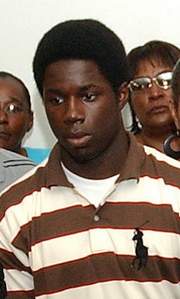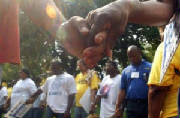| LOUISIANA STANDARDS ON INDIGENT DEFENSE | News.doc LSBA new [model] ABA Rules on Professional Conduct |
Splitting 5-4, the Supreme Court on Tuesday overruled its 23-year-old ruling in Michigan v. Jackson on the rights of a criminal suspect in police custody who has asked for a lawyer. The Court did so in Montejo v. Louisiana (07-1529), in an opinion written by Justice Antonin Scalia. After Scalia announced the decision, Justice John Paul Stevens spoke orally for the dissenters — a somewhat unusual gesture. Stevens was the author of the 1986 decision that was cast aside; he was the only member of the Court then who is still sitting. Michigan v. Jackson overrulled in Montejo v. LouisianaSotomayor
Louisiana Public Defender Board Staff. The Spotlight is steadily glaring on the state of Louisiana. Within the boundaries of today's SCOTUS decision is a blatant 5 to 4 conservative response in answer to an already vulgar criminal justice apparatus in Louisiana & America.
Brief of AMICI CURIAE the Louisiana Public Defenders Association in Support of Petitioner JESSE JAY MONTEJO V. STATE OF LOUISIANA - rendered 26 May 2009.
The Sixth Amendment provides a right to counsel at each “critical stage” of a criminal proceeding. This case addresses whether a defendant must affirmatively accept the appointment of counsel to receive the protections of that right, particularly the protection not to be interrogated by the state without counsel’s presence or consent.
INDIGENT DEFENSE IN NORTHEAST LOUISIANA Both expenditures and revenues for the 4th Judicial District have increased over
the years under study. Because the data collected in the previous study is in a
different format than the data collected for the last two years, the individual line
items are not directly comparable; instead, focus should be placed on the total
revenues and expenditures when making comparisons. In addition, the 2003 and
2004 totals represent 11 month totals (January through November); the 2006
figures are full-year totals. The 4th Judicial District is unique among the four under study here as it is the only Judicial District that has a formalized on-going training program for public defenders who handle felony cases.
This training occurs monthly and is open to
all public defenders from other Judicial Districts. The 4th Judicial District is also
working to prepare a training manual that can be easily distributed, as well as
expanding the training program to include public defenders who handle
misdemeanor cases and one for those how handle juvenile cases. These
subsequent training courses will also be open to all public defenders from other
judicial districts.
Effective August 15, 2007, the Louisiana State Legislature enacted a new law (R.S.
15:146-184) revising the Louisiana Indigent Defense Assistance Board (LIDAB)
and creating the new Louisiana Public Defender Board (LPDB). This new law
provides that the LPDB shall have “all regulatory authority, control, supervision,
and jurisdiction, including auditing and enforcement, and all power incidental or
necessary to such regulatory authority, control, supervision, and jurisdiction
over all aspects of the delivery of public defender services throughout the courts
of the state of Louisiana” (R.S. 15:147). What was known as “indigent” defense
has since become “public” defense. The adage “the name has changed but the
game remains the same” certainly applies.
Indigent Defense Services Task Force
Louisiana Public Defenders Association
NACDL Indigent Defense Recent Developments In the spring of 2003, the Louisiana State Bar Association passed a resolution in honor of the 40th anniversary of the Gideon decision that called into question the adequacy of adult indigent defense services in Louisiana and urged the state government to establish a “Blue Ribbon Commission to develop a strategic plan for indigent defense system reform and set a timetable for implementation.”
LASC Rule XXXI (3) Private Practice of Law. A staff attorney of a district indigent defender board, who is a permanent, full-time employee of the district board, shall not engage in the private practice of criminal law in the same jurisdiction in which he or she serves as a staff attorney. The said attorney, however, may be permitted by the district board to have a private civil law practice in the same jurisdiction in which he or she serves as a staff attorney, provided such practice does not conflict with or otherwise adversely affect the duties owed by the attorney to his or her indigent clients.
What's the matter with this picture? Already the "wheel of justice" rolled when the news article showed the "leading" photograph of this 19 year old accused suspect, as he was being transported to OCC.
The 40 something year old trigger-man is the real culprit. Video surveillance doesn't show the 19year old in the store. The 19 year old doesn't admit to knowledge of the crime, before leaving Morehouse Parish.
 Will the Indigent Defense system of the 4th Judicial District provide adequate assistance of counsel.
Will the Indigent Defense system of the 4th Judicial District provide adequate assistance of counsel.IN DEFENSE OF PUBLIC ACCESS TO JUSTICE
To recognize the 40th anniversary of the Supreme Court's decision in Gideon v. Wainwright, 372 U.S. 335, 83 S.Ct. 792, 9 L.Ed. 2d 799 (1963), and to rededicate the State of Louisiana to the promise of equal justice for all, regardless of income, in accordance with the American Bar Association’s (ABA) Ten Principles of a Public Defense Delivery System, by creating the Louisiana Task Force on Indigent Defense Services.
WHEREAS, 2003 marks the 40th anniversary of the Supreme Court's decision in Gideon.. .
WHEREAS, the Supreme Court stated in Gideon the "obvious truth" that "in our adversary
system of criminal justice, any person haled into court, who is too poor to hire a lawyer,
cannot be assured a fair trial unless counsel is provided for him"; and
WHEREAS, the Supreme Court has consistently extended the right to counsel to critical
stages of criminal proceedings and any case that may result in the potential loss of liberty,
including: direct appeals -- Douglas v. California, 372 U.S. 353 (1963); custodial
interrogations -- Miranda v. Arizona, 384 U.S. 436 (1966); juvenile proceedings resulting in
confinement -- In Re Gault, 387 U.S. 1 (1967); preliminary hearings -- Coleman v. Alabama,
399 U.S. 1 (1970); Louisiana Justice Coalition








